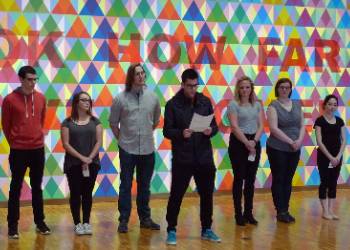101 Professor Robert Bruss (session 1, 100% distance learning)
Course Title: Books that Matter: Finding One’s Place in the World
Course Description: One way that literature often matters to readers is its ability to help us feel like we’ve found a home in a world we sometimes feel lost in. Or, when we feel like an outcast or outsider, to realize we’re not alone in that experience. In this class we’ll read a series of books and poetry about people who are trying to find their place in the world. As we read, we’ll talk about the ways literature can help us see the world in new ways, forge connections through themes and characters, and even imagine new realities we might bring into being. The premise of this course is that learning to read complex, important literature in an intelligent, effective way is a useful and even inspiring activity. I hope you can relate to this literature and even find in it encouragement, support, and strategies for survival when you feel adrift, disconnected, or rejected. Regardless, we’ll explore some of the central questions that give literature value and discuss methods for unlocking that value for yourself. This course invites students to become writers inspired by and engaged with the texts they read in thoughtful, original ways.
Readings: Junot Diaz, The Brief and Wonderous Life of Oscar Wao; Mohsin Hamid, Exit West; Jon Krakauer, Into the Wild; selected poetry
Assignments: Several short creative assignments, reading journal, engaged discussion
102 Professor Grant Gosizk (session 1, 100% distance learning)
Course Description: Technology can be exhausting. Do you ever get Zoom fatigue? Maybe it makes you feel listless, or lonely. Or, maybe you have a different experience. Maybe you look at a Tesla driving down the street and feel enthusiastic about the technological innovations that might occur in the future. To put it simply, our relationship with technology is complicated.
Literature has long been a place where people go to better understand their relationship to technological innovation. Authors from diverse backgrounds have contemplated the technological conditions of their historical moment and used literature to explore its affect on their lives and the world around them. Whether bemoaning the loss of a simpler time or looking boldly into the future, they used literature to help them, and us, better understand our collective experience of technology and speculate about our futures. ENGL2011 is an invitation to that conversation.
In this class we’ll explore how technology has affected our relationship to nature, money, work, death, one another, and other important topics by reading novels, short fiction, essays, and prose from various authors. As we read, we’ll discuss how and why fiction, itself an imaginary realm, helps us navigate (or at least deal with) our technological reality. The premise of this course is that learning to read complex, important literature in an intelligent, effective way is a useful and even inspiring activity. ENGL 2011 will help students become curious, empowered, engaged readers and to find their own voices in an ongoing conversation with books.



